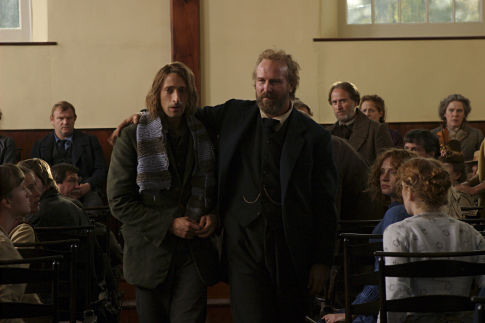Edward Walker taught American History at the University of Pennsylvania, and was the son of a prominent and wealthy businessman. When his father was killed by a business partner over a dispute concerning money, Walker sought grief consoling over his loss.After meeting with a number of people who had lost loved ones to senseless acts of violence, Ed...
Show more »
Edward Walker taught American History at the University of Pennsylvania, and was the son of a prominent and wealthy businessman. When his father was killed by a business partner over a dispute concerning money, Walker sought grief consoling over his loss.After meeting with a number of people who had lost loved ones to senseless acts of violence, Edward formulated an idea. Using his knowledge of American History, he proposed establishing a small settlement based around the late 19th Century, in the center of a Wildlife Preserve owned by his family. Walker's belief that establishing a small settlement at this period in time, would lead to a society that would not spawn the violence that had taken the lives of his father and others.Walker took a number of steps to preserve the secrecy and sanctity of the village. Through the use of his family fortune, a deal was made that kept airplanes from flying over the Wildlife Preserve. Walker also formulated a myth that creatures lived in the woods, and that the villagers had long ago reached a pact to not trespass into the woods. In exchange, the creatures would not harm or enter into the village. Specially-made suits and wind devices in the trees would help sell the lie to younger generations, as well as various ceremonies were established to show an appeasement to the creatures.Edward and his wife Tabitha Walker, along with several other members, became known as The Elders, and established the little village, calling it Covington. Each of the members was given a black wood box with which to store various mementos of their past lives from the outside world, as a reminder of the pain they had suffered. They each took an oath to not go back to the towns, and would instill in future generations a fear of them as well. All members of the society would wear period clothing, and talk in the style of the time. Various colors would be utilized and shunned. Yellow would be worn by townspeople when they ventured close to the borders of the village. Red was shunned and considered a 'bad color.' Any traces of red coloration were to be destroyed.After Covington was established, the families that had settled had children of their own. The Walker family had two girls, Kitty and Ivy. Of the two daughters, Ivy suffered the loss of sight shortly after her birth.Walker took on the job of teaching the village's children, and the village seemed a simple and idyllic place, until violence pervaded the village with the stabbing of Lucius Hunt by Noah Percy, the first crime ever committed in the village. Edward was then asked by his daughter Ivy to be allowed to pass through the woods to retrieve medicines to save Lucius, of whom she had planned to wed.Edward faced a difficult decision, but ultimately confided the secrets of the creatures in the woods to his daughter, and allowed her permission to go. This decision angered several of the village elders, but Walker claimed he had done so to preserve their ways. Because his daughter did not take the oath, she could go.Word soon after reached Edward that Noah had escaped from his imprisonment, and taken one of the creature suits. When word of Ivy's return came, and that she had encountered and killed one of the creatures in the woods, Edward saw a silver lining to the tragedy. The fact that Noah's ruse seemed to have scared Ivy back into the belief of creatures in the woods, it now becomes apparent to Edward that Ivy will not attempt to pass beyond the borders of the woods again, and that their secrets and lies will continue.Edward explains to the other elders that to help back up their story, they will give Noah a proper burial, and claim he was killed by the creatures.
Show less «



